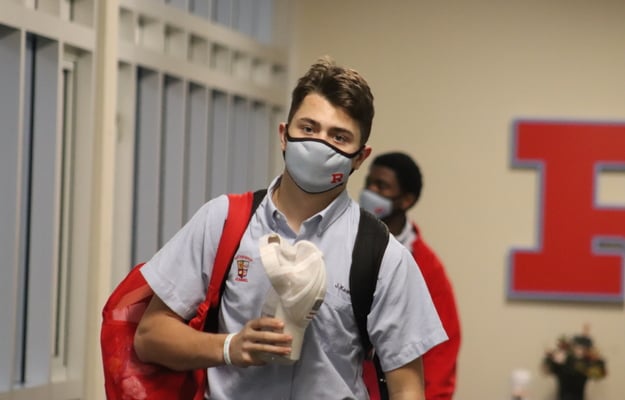
A platform that encourages healthy conversation, spiritual support, growth and fellowship

NOLACatholic Parenting Podcast
A natural progression of our weekly column in the Clarion Herald and blog

The best in Catholic news and inspiration - wherever you are!
How have COVID adjustments affected learning?
-
By Peter Finney Jr.
Clarion HeraldWhile it still is too early to determine how much student achievement has been affected by the changes to teaching styles brought on by the pandemic, Dr. RaeNell Houston, executive director and superintendent of the Department of Catholic Education and Faith Formation, believes Catholic school students will fare favorably as a whole because they have spent more time in the classroom over the last 10 months than other students.
Houston said most Catholic schools administer benchmark tests to assess where their students are, and the winter benchmark testing should be completed by the end of January. Another benchmark assessment will be completed at the end of the academic year.
“We have not taken a dive into that data yet,” Houston said, adding how a system-wide review is being planned by Kasey Webb associate superintendent of academic excellence.
Houston said it is no surprise that student learning has been affected by the sudden shift to distance learning in March 2020 and then by the frequent shifts in teaching methodologies – from in-class to in-home to hybrid – necessitated by governmental precautions against the spread of COVID-19.
Learning gaps analyzed
“I can speak in general terms,” Houston said. “Just like we expected, most of our students have come back with some gaps in learning because we missed the entire fourth quarter of the last school year. We did virtual instruction or remote instruction or at-home learning. It was kind of varied by location as to what our capabilities and resources would allow. But that is no substitute for face-to-face learning.”Houston said the quick shift to remote learning last March did not allow many schools to adequately prepare, and “we did the best we could with the resources that we had. We owe a debt of gratitude to our teachers because they pivoted quickly, and they did a tremendous job in shifting their teaching and learning processes for our kids.”
Schools worked to stay open
Houston said when schools assessed the learning gaps at the beginning of the 2020-21 academic year, they worked diligently to “address those gaps” while working “extremely hard to keep our kids healthy and safe and making face-to-face instruction a priority. To this date, we have not been forced to close any schools because of outbreaks or clusters of positive (COVID) tests. We’ve been so blessed that we’ve been able to keep our kids in our buildings and provide face-to-face instruction and formation that they need.”Houston believes the Catholic schools’ ability to do more in-class learning than the public school system will result in better academic achievement when the assessments are made.
“Most of the research suggests that face-to-face instruction – high-quality, face-to-face instruction – yields better results than virtual learning,” Houston said. “We’re new at the virtual learning piece because we have been traditional schools where we have operated face to face. That’s been our strength. But our faculty have gone through extensive training over the summer, and they are continuously honing their (online) skills. We are quickly becoming very proficient.”
Parents note the difference
Houston said there is enough anecdotal evidence to indicate the superiority of in-class learning compared to remote learning.“I was on the phone with a parent who has four children in Catholic schools – one in elementary and three in high school. And, her high school students are not performing at the same level or earning the same grades. They’re not as engaged in the virtual learning as they are when they’re in face-to-face instruction.”
Houston said when the dust settles – and this year of strange times in education are analyzed by experts – she expects it will show that the Archdiocese of New Orleans has much to be proud of in going to great lengths to educate its students.





